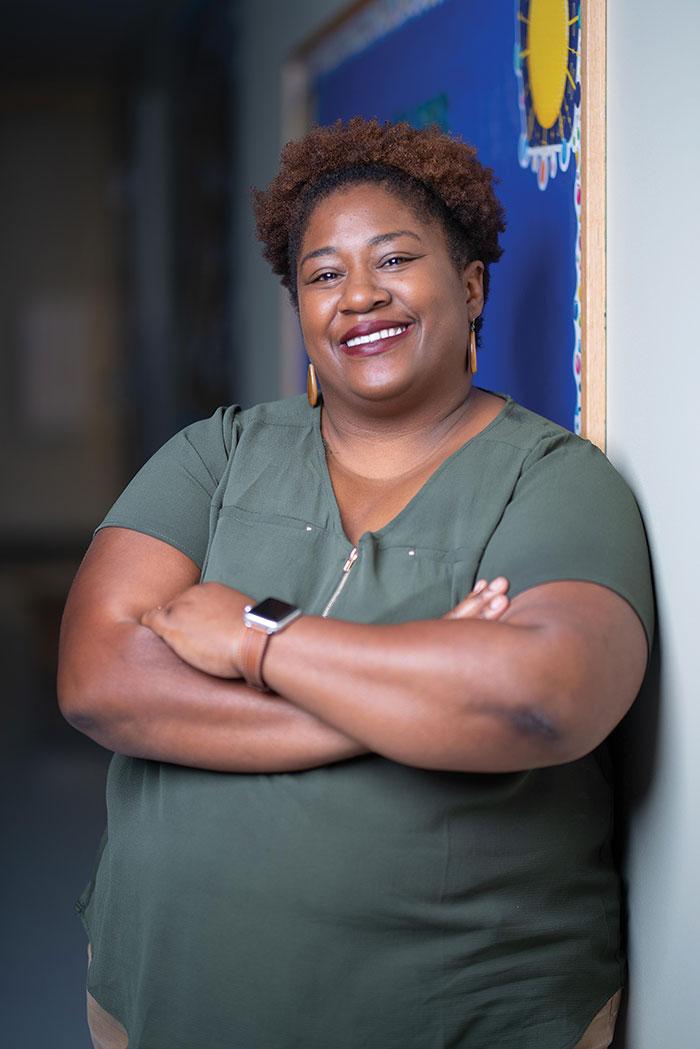As an instructional technology coordinator at Life School, a K–12 charter school just south of Dallas, Texas, Knikole Taylor supports teachers as they bring technology into their classrooms. Because she sees technology as a tool for building community as well as knowledge, Taylor approaches her role as a combination of teacher advocate, technology champion and educational coach.
As an instructional technology coordinator, who do you work with and how?
I work with teachers and students from K through 12th grade with all things teaching and learning. … One thing that we’re working on right now is when we help teachers to use technology to allow our students to have a voice so that the things that they do in their classrooms don’t die in their classrooms.
In your experience, what’s the biggest obstacle teachers face when they want to share their students’ work beyond the classroom?
I just always assume it’s a lack of knowledge or lack of exposure. … That’s one thing that I’ve noticed—that when it comes to some of the more innovative technology or the exposure, a lot of those things in our Dallas area happen in the north. … [On the south side], the suburbs of Dallas where we teach predominantly brown and black children, teachers are predominantly brown and black as well. A lot of those opportunities for learning and those areas or practices where companies will come—they’ll have it [on the north side of the city], but it’s not necessarily on the south side. So we’ve really worked and been intentional on bringing a lot of those things to our teachers so they can be exposed and then expose our kids to them as well.
One of the things you’ve worked on with teachers is Ed Camp, which works to build communities of educators. Can you explain a little about that?
About six years ago, I was in a place where I was just kind of going through the motions of an educator. Someone on Twitter said, “Hey, you know, you could go to this Ed Camp.” I looked online and there’s one that’s four hours away, … and on my way there, I thought, “We have to have this.”
We hosted our first one, I think, about three years ago. ... The secondary teachers were on the second floor, the elementary teachers were on the third floor, and we just allowed them to just talk about the things that they feel like they needed to talk about.
After we had that Ed Camp, we had two of our school districts offer help: a chance to have a student Ed Camp [for] early-college high school [students]. … It’s just that model of allowing students to self-direct what they need and get it from each other. We’ve also had Ed Camps and used Ed Camp models for faculty meetings and professional development, so it has really caught on.
How do you use Twitter and other innovative technologies to strengthen your own practice?
I just started to connect with other educators who were similar to me, had some of the same goals and objectives as far as education. And really, I called Twitter a place to kind of vet it out as well as connect with people who were very different from me, to broaden our horizons and really to learn from other people. And to this day, that’s generally what I use Twitter for. …
As a teacher coach, I’m quick to tell [teachers] when they ask me something, “You know, I don’t know.” … I’ve gone to Twitter so many times to say, “Hey guys. I don’t know this, but I have a teacher who needs assistance with this. Can you help?”
I’ve met some amazing people. Teaching Tolerance, I found out about you guys via Twitter, EduColor—a lot of things that have benefited my work as an educator of color and really helped me to see my value as an educator.
What do you wish that educators knew or understood or believed about the work you’re doing?
I’m most passionate about helping educators … to see the power and the value of their own voice, and not waiting on someone to tell them what they need to know. We teach because we love students and we want to change students, but I feel like it’s deeper than that. And I really think that teachers can only find that when they truly find their own style, and they really connect with truly decent work and say, “This is what’s really important to me and this is exactly what I want, that’s important to be here.”
So that’s why my role as a coach is so important and so valuable—because the average teacher says, “Hey, you know, I found this, but I don’t really know what it is” or “I don’t really think I can do it.” And I’m like, “Oh, yes you can! Let’s do it!”
I think it’s really powerful when teachers make that shift from idly sitting by and waiting for someone else to tell them what’s important to just breaking down those walls and making those connections on their own. Because then it’s reciprocal, and then you see them get the same things for their students, and that’s ultimately what we want.
Knikole Taylor is an instructional technology coordinator at Life School, serving Dallas and Ellis Counties in Texas.
Know an excellent administrator, librarian or counselor we should interview?
Tell us all about them.


0 COMMENTS